Archive for March, 2010
Community gets behind CARIFTA games
(CNS): With only four days to go before the opening of the CARIFTA games excitement among local sports fans is mounting. The community has been coming together to support the event and many people have been engaged in fund raising efforts especially to help the athletes who will be participating in the games from Haiti. For the first time people will be able to watch the games live across the region as LIME sponsors the TV coverage. The Cayman Islands Football Association (CIFA) has also done its part to support its fellow sports persons by postponing the Senior Men, Women and Youth games which was originally scheduled for the same dates.
“This decision was made by the CIFA executives to ensure that these athletes get full and undivided support during this seasonal event,” a spokesperson for CIFA said adding that details of the news dates for CIFA would be released soon.
The Caribbean Media Corporation (
“LIME recognizes CARIFTA as one of the most important events on the region’s athletic calendar and the critical role the games play in developing young athletes,” said Chris Dehring, LIME’s Chief Marketing Officer.
For more details of the games and events schedule log on to www.carifta2010.ky
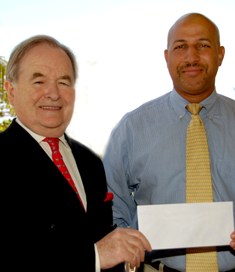
Friends raise cash for team Cayman
 (CNS): While all eyes might be on the CARIFTA games taking place this Easter weekend at the Truman Bodden sports complex, the Friends of Cayman in London were looking ahead to next year’s Island Games when the Cayman Islands will be sending a team to the Isle of Wight in the UK. The friends hosted a fund raising event at the House of Commons, to raise money for the games which is the only international sports competition that allows residents as well as Caymanians to compete together on the same team.
(CNS): While all eyes might be on the CARIFTA games taking place this Easter weekend at the Truman Bodden sports complex, the Friends of Cayman in London were looking ahead to next year’s Island Games when the Cayman Islands will be sending a team to the Isle of Wight in the UK. The friends hosted a fund raising event at the House of Commons, to raise money for the games which is the only international sports competition that allows residents as well as Caymanians to compete together on the same team.
The principal organizer of the fundraiser and former governor, John Owen, said it was a most successful evening. “The amount of money raised has exceeded my expectations and I am most grateful to all the Friends of Cayman and their guests, who so generously supported this event,” he said as he handed over a cheque for approximately CI $22,000 to the Association for the 2011 Games.
Westminster on Thursday 18 March to raise money for the Cayman team which is one of the only international
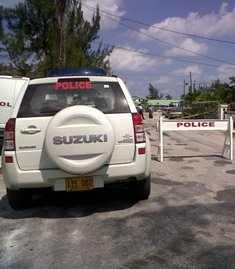
Cops track down fugitive in GT shooting
 (CNS): Police said this morning that they have now taken Mark Anthony Seymour into custody following his charge for attempted murder on Friday 26 March. The RCIPS said that they had charged 25-year-old Seymour, who is from George Town, with the crime in absentia as they had enough evidence to tie him to a recent shooting in Windsor Park but had not located him at that time. Seymour was arrested following a police operation in the South Sound area yesterday afternoon (Monday 29 March) when a 28-year-old man was also arrested on suspicion of harbouring a fugitive in the same operation.
(CNS): Police said this morning that they have now taken Mark Anthony Seymour into custody following his charge for attempted murder on Friday 26 March. The RCIPS said that they had charged 25-year-old Seymour, who is from George Town, with the crime in absentia as they had enough evidence to tie him to a recent shooting in Windsor Park but had not located him at that time. Seymour was arrested following a police operation in the South Sound area yesterday afternoon (Monday 29 March) when a 28-year-old man was also arrested on suspicion of harbouring a fugitive in the same operation.
Seymour now joins two other men who were also charged with attempted murder on Friday in connection with the same shooting. The charge relates to an incident on 5 March when shots were fired at, and into, a house in Templeton Lane in the Windsor Park area of George Town.
The other two men who have been charged are Luis Robert Verona, 27, from West Bay, and Sven Brett Connor , 29, from Newlands who appeared in court yesterday.

Beating the Dinosaurs
Has anyone paused to consider how valuable Cayman News Service has become to the Cayman Islands? In short time this humble Web-based news organisation has become the national leader for fast and reliable news.
Every day CNS beats much larger and better-financed news companies to the punch. No one is as reliably fast as CNS. No one offers a more convenient and functional Web site than CNS.
What is even more remarkable about the meteoric rise of CNS is that virtually all of its news content is written and edited by only two people. Nicky Watson and Wendy Ledger are embarrassing Cayman’s news media giants, some of which have scores of reporters and editors to go up against Watson and Ledger. How do they do it? How are these two women able to scoop the competition day after day? While they are smart and that surely matters, the key to their success is likely due in large part to the arrogance and laziness of Cayman’s older news media. For example, print media in Cayman has traditionally been content to rake in profits while treating news articles as little more than filler to occupy the white space around the all-important ads on their pages. As the Web age dawned, it should have been clear that they would need to adapt and offer Web sites that are rapidly updated as news develops. But, true to form, they did not. Compare the news Web sites of other local media to CNS. Somehow, even though they are heavily out-numbered in personnel and out-gunned in resources, CNS manages to beat them on stories virtually every day. If nothing else, it shows that money and a staff the size of a small army aren’t everything.
No less important than their fast reporting, CNS has provided a desperately needed forum for the Caymanian people. The comments posted on CNS provide an invaluable window into Cayman society. By allowing anonymous comments, censoring only the blatantly evil and insane, CNS has become a unique measure of Cayman’s mood and mindset. When crazed politicians and media dinosaurs criticize CNS for allowing anonymous posts, they only insult the public’s intelligence. As if we don’t know that there are vindictive and wormy people in positions of power who would not hesitate to harm someone over a single disagreeable comment posted on a news site. For example, there is a current government minister who was a civil servant several years ago and openly admitted on a radio talk show that he had checked with the Immigration Department to seek out information about someone who wrote a letter to the editor that was critical of his work. It is difficult to determine which is worse, the fact that the person used the Immigration Department for this purpose or that the person felt sufficiently at ease about it to discuss it on the radio.
There are many passionate and intelligent people in the Cayman Islands who have ideas worth sharing. There are also many passionate lunatics who have ideas worth being afraid of. All of these thoughts should be heard and it is good that CNS has given them a home.
CNS is embarrassing the competition in this arena too. Compare the number of comments posted on CNS in response to a hot news story with the number of comments posted on the site of older and larger news companies. The difference is striking. There are often more than 100 comments posted on CNS in reaction to one report while their competition’s site usually has one or zero posts after a report on the same news event. Doesn’t this bother the dinosaurs? Doesn’t this tell them that something about their product and organization is missing the mark? Or do they even notice?
All of Cayman should be grateful to Watson and Ledger. Their efforts have given the Cayman public a reliable place to visit for breaking news as well as to share thoughts, make suggestions, or simply vent a bit of anger and frustration. Let’s hope CNS is here to stay. We need it. Cayman desperately needs a fast, intelligent and competent news source that sincerely cares about getting information to the public. Yes, Cayman’s lumbering dinosaurs should be very worried about what CNS is doing. But, chances are, they haven’t even noticed.
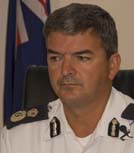
Gangs share guns, says CoP
 (CNS): The commissioner of police has described the firearms being used by local gangsters as communal and says the police believe the guns are being passed around and re-used. He admitted that while the police know which weapons are being used in which crimes, they are finding it difficult to recover those specific guns as the gang members hide them in different locations and pass them on to other members. Speaking at a press conference last week relating to the further escalating gang violence, David Baines said the police know quite a lot about the weapons and who is using them but the difficulty is securing evidence. (Photo by Dennie Warren Jr)
(CNS): The commissioner of police has described the firearms being used by local gangsters as communal and says the police believe the guns are being passed around and re-used. He admitted that while the police know which weapons are being used in which crimes, they are finding it difficult to recover those specific guns as the gang members hide them in different locations and pass them on to other members. Speaking at a press conference last week relating to the further escalating gang violence, David Baines said the police know quite a lot about the weapons and who is using them but the difficulty is securing evidence. (Photo by Dennie Warren Jr)
“We are having difficulties and while we have got some weapons that have been recovered … they are not the prime weapons we are looking for. They are not the specific guns that are swapped, used and passed around gang members,” Baines said. “We do have intelligence that shows specific guns have been used for different shootings, in different circumstances. We are able to identify which is the common weapon and, of course, our challenge is to put that weapon into somebody’s hands.”
The commissioner stated that while he believed there are more than enough guns on the island, the weapons being used to kill people are a small number, shared among members and are of a particular nature.“ They are almost communal, they are accessible by gang members, they are passed around and not solely in the possession of any single gang member,” Baines added.
The issue of trackingand following the behaviour of the known gang members, the commissioner said, is the priority focus of the RCIPS. He said the police had considerable information and intelligence about the gang members and who is committing the crimes. The main problem, he explained, was getting the evidence to secure convictions.
Explaining what the police believe is the current situation with the gangs that are currently involved in the crime, he said the police know a lot about them and their criminal activity. The commissioner said two gangs have fallen out in West Bay and there are gangs in George Town that have connections with these West Bay gangs, as well as gang representation in the eastern districts.
“Often the gangs are a loose affiliation of criminal people that are engaged together in criminal enterprise,” the commissioner said. “They are engaged in drug shipments which have also been used as cover for firearms.” He added that the membership of the gangs shifted affiliation. Some people had been in every gang, depending on friendships and associations at a given time.
“What do we know about them? We know a lot about them. We know who the gang members are and we know who is responsible for the shootings because people tell us,” the commissioner declared. “But people telling us does not translate itself into evidence. We know who the main individuals are and have a picture of every one of those members, which drives the action of our officers.”
Baines explained that the police follow the main suspects around on a persistent basis. And while the known gang members are constantly stopped and searched in an effort to prevent them from engaging in criminality, the police were constantly frustrated by lack of evidence. He described a revolving door of suspects coming through the police system, but they were forced to release the individuals as they cannot be tied to specific crimes without forensic or eyewitness evidence.
The commissioner said the police would be making use of the gang legislation, part of the penal code which has been on the books for some five years but has never been used before. He said that police would be looking more closely at the law to see if it can help prevent the gangs from shooting each other. He said there was now a dedicated unit within the RCIPS which would be working on prosecuting people that the police could prove were gang members under that legislation.
“We are working closely with the legal department to make sure that we push the envelope in terms of useof evidence and interpretation of what is considered to be evidence of gang membership,” he added.
As a result, the police will continue the sweep up of suspected gang members to start to close down the level of violence perpetuated on a daily basis. While Baines promised to push the limits of the legislation he said they would not cross legal boundaries to jeopardize future prosecutions.
PPM asks UK not to tax
(CNS) The opposition has joined the government in calling on the UK not to change the economic model in the Cayman Islands with the introduction of direct taxes. In the wake of the recent letter to the local government fromthe OT director, Colin Roberts, that the UK is still expecting some new revenue raising measures from the Cayman government, the PPM has submitted a position paper to the FCO. The paper indicates that the UK should not undermine the jurisdiction’s financial services sector by forcing taxes on the country, despite the government’s failure to balance this year’s budget.
Although the People’s Progressive Movement has raised a number of concerns about the current government’s economic strategy, the opposition is singing from the same song sheet when it comes to taxation, with the party telling the UK that taxation would rock the pillars of the Cayman Islands economy.
Leader of the Opposition Kurt Tibbetts stated that, at the request of the FCO, he and members of the opposition met the delegation in connection with the current fiscal difficulties last week. Tibbetts described the meeting as frank and useful and said the FCO team of Andrew Paterson, Economic Advisor, Overseas Directorate and Carole Pretorius “were grateful for the insight provided by the opposition.”
Former education minister Alden McLaughlin told CNS that the FCO delegation had asked for the PPM’s input regarding the economic situation, and as a result the party had submitted a position paper.
“We hope this paper have some influence in the UK about not pressing for direct taxation,” McLaughlin said. “The major point is we want the UK to understand that it should not try to alter the fundamentals of the existing economic model. Direct taxation has certainly not helped the major countries so there is no reason to expect it would help Cayman.”
In the paper the PPM says taxation would slow the recovery and harm the country’s economic pillars. “We discern from the Director of the Overseas Territories Directorate’s letter of 12th March, 2010 that the UK is still pushing for us to identify additional sources of revenue and, it appears, for us to adopt some form of direct taxation. We do not agree with additional taxation, particularly in the present environment,” the document says.
Aside from the issue of taxation, the opposition says it hopes the new governor will directly tackle the issue of public spending as the PPM states that, with revenues shrinking as a result of the recession, government spending must shrink equally. The party said it was optimistic that the governor wouldl at last play his part as the person with constitutional responsibility for the civil service.
“The system visualised by the PFML and PSML presupposed that there would be somebody at the top to keep an eye on the civil service, someone who would ensure that the civil service operated in the intended manner. But, until now, no one has done that – neither the Governor, nor the Head of the Civil Service, nor the Financial Secretary,” the PPM states in the paper.
The party also notes that there was no mention in the recent Miller report of who has power over the civil service. “It is also unfortunate that the Miller/Shaw Report does not acknowledge that the elected Government does not have control of the civil service, and that this rests in the hands of the Governor and his appointed delegate,” the PPM told the UK.
The paper sets out the PPM’s concerns over the sale of government assets, the need for proper assessments before any services are privatized or before government enters into private sector partnerships.
The current uncertainty surrounding the economic situation is another issue which the PPM raises, in particular the constantly changing decisions about how government plans to tackle the budget deficit. “We are concerned by the state of uncertainty and ever increasing fear that has been steadily growing since the new government took office,” the PPM said.
“This is undermining confidence in a jurisdiction which is already challenged because of the huge increase in violent crime in recent months. The country is faced regularly with announcements that government will not be able to meet its obligations, then that all is well; that salaries and benefits of public servants will be cut, then the following week that they won’t be, then the next month that they will be; that key government assets will be sold off, then that they won’t be. This must cease.”
The PPM offers its backing to the proposed three-year plan and says it is optimistic that there is “no more nonsense about getting government finances straightened out within the year,” presuming that, as the FCO requires a three-year plan, it does not expect the budget to be balanced this year and has relaxed the controls over borrowing. “We are pleased but not surprised to hear that the FCO is willing to relax the finance requirements to allow the minimal necessary borrowing while we carry out the plan,” the PPM states.
The opposition team told the UK it believed the government must develop and announce a sensible recovery plan and then the country must be allowed to settle down and work through the challenges presented by the economic conditions the whole world is experiencing.

“Put me in a Jamaican prison, please!”
 (Jamaica Observer): Derrick Brooks, a 45-year-old man serving life for drug trafficking in a Cuban prison, has accused the Jamaican Government of refusing to facilitate his transfer to a Jamaican penal institution, despite willingness by the Cuban authorities to send him back home. According to Brooks, there are more than 31 Jamaicans languishing in Cuban prisons who are desperately in need of help, as they receive no rehabilitation, and are denied the opportunity to study or even visit the library in many cases. "I am on lockdown 24 hours a day although I might get just one day for a little sun…I have never been to the library — to study or to work — and I am a professional welder," he said.
(Jamaica Observer): Derrick Brooks, a 45-year-old man serving life for drug trafficking in a Cuban prison, has accused the Jamaican Government of refusing to facilitate his transfer to a Jamaican penal institution, despite willingness by the Cuban authorities to send him back home. According to Brooks, there are more than 31 Jamaicans languishing in Cuban prisons who are desperately in need of help, as they receive no rehabilitation, and are denied the opportunity to study or even visit the library in many cases. "I am on lockdown 24 hours a day although I might get just one day for a little sun…I have never been to the library — to study or to work — and I am a professional welder," he said.
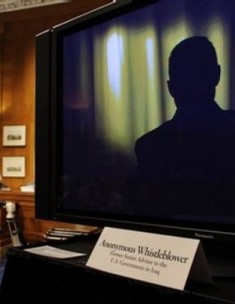
HRC queries anonymity law
 (CNS): The chair of the newly formed Human Rights Commission has written to the government raising concerns about the recent implementation of the witness anonymity law, which will allow people to give evidence without revealing their identity to both the police and the courts. Richard Coles, a former Cayman Islands attorney general, told CNS that the HRC was not shown the bill before it went to the Legislative Assembly and there are a number of questions about it which may not only pose a threat to the rights of defendants but that it could also be unconstitutional.
(CNS): The chair of the newly formed Human Rights Commission has written to the government raising concerns about the recent implementation of the witness anonymity law, which will allow people to give evidence without revealing their identity to both the police and the courts. Richard Coles, a former Cayman Islands attorney general, told CNS that the HRC was not shown the bill before it went to the Legislative Assembly and there are a number of questions about it which may not only pose a threat to the rights of defendants but that it could also be unconstitutional.
Coles explained that the commission has sent a letter to the Deputy Governor’s Office pointing out a number of issues about the Criminal Evidence (Witness Anonymity) Law 2010 which could cause problems with regard to the success of the legislation. Coles noted that in general the right to cross examine a witness is a fundamental right of anyone being prosecuted but the commission recognises that exceptional circumstances call for exceptional measures. However, the HRC chair said the commission would be observing further erosion of rights that go the heart of a fair trial.
“We have two specific concerns about this particular piece of legislation,” Coles said, explaining that in section 2 the crimes to which the law may apply are set out as well as a clause indicating that the Governor in Cabinet may add to that list of offences without referring the bill back to the elected members of the Legislative Assembly for amendment. The list of offences is already considerably longer than the law it is modelled on in the UK, and this clause would enable the list to grow without input from the people’s representatives.
The chair noted that this essentially meant the elected arm of government had enabled the executive arm to change a primary piece of law without debate. “To my knowledge this is the first time the Legislative Assembly has delegated such authority to the Cabinet,” he added.
Coles explained that while Cabinet is normally responsible for subsidiary legislation or regulations, it is the Legislative Assembly that would amend the primary law and that in this case the separation of powers have been blurred. He said that this was a bad precedent to set and could also leave the legislation open to challenge. With a defendant’s rights already threatened, although understandable in exceptional circumstances, Cole noted any further erosion would be of significant concern.
The second issue that has caused Coles and his colleagues on the commission concern is that the law may not work as well as the authorities have intended, quite simply because the witnesses will not be entirely anonymous as their identities will be revealed to juries.
“Given the size of the Cayman Islands, how much comfort could a witness take if the jury will know who they are?” Cole asked. “It will be quite an issue to convince a witness that they do have genuine anonymity when they are known to the jury.” He suggested that this deficiency in the law may very well prevent the legislation from achieving its main goal.
“The HRC is as concerned about crime as everyone in the Cayman Islands, but had we been able to see the legislation before it made its way to the Legislative Assembly we may have been able to advise government on some of these potential problems,” Cole added.
He noted that while there was a need to address the current escalation of crime through changes in legislation and new ideas, “Good ideas need some thought,” and said the HRC was willing and able to assist in the thought.
With a number of laws in Cayman already needing to be addressed to make them compatible with the bill of rights, which will take effect in Cayman in November 2012, Coles said that the HRC has asked government to ensure that on all future legislation the commission is given the opportunity to look at it so it can at least advise government on any potential human rights abuses before new laws are enacted.
Check CNS throughout this week for more from Richard Coles on the HRC’s future plans, education campaigns, its current powers under the constitution, its future role once the Bill ofRights is implemented and its position on various other topical issues.

Teenagers arrested for KFC armed heist
 (CNS): Following a law enforcement operation on Sunday night in the George Town area the police have arrested three teenagers aged 16, 18 and 19 years. The RCIPS said the teenagers are currently in custody in connection with the armed robbery at KFC on the 23 March 2010. According to witnesses at about 10.30 p.m. on Tuesday 23 March, three men entered Kentucky Fried Chicken in West Bay Road one of which was armed with what appeared to be a firearm and another had a machete. (Photo by Dennie Warren Jr)
(CNS): Following a law enforcement operation on Sunday night in the George Town area the police have arrested three teenagers aged 16, 18 and 19 years. The RCIPS said the teenagers are currently in custody in connection with the armed robbery at KFC on the 23 March 2010. According to witnesses at about 10.30 p.m. on Tuesday 23 March, three men entered Kentucky Fried Chicken in West Bay Road one of which was armed with what appeared to be a firearm and another had a machete. (Photo by Dennie Warren Jr)
They men reportedly threatened staff before making off with a sum of cash from the premises. No shots were fired and no-one was injured. Police said enquiries into the case continue but did not state if the suspects are believed to have been involved with any of the other armed robberies that currently remained unsolved.
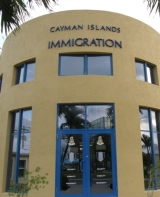
Men charged in hostage case
 (CNS): Police said today that they have now charged two men with abduction, keeping in confinement an abducted person, blackmail, and assault ABH in connection with the kidnapping of an unnamed local man in Grand Cayman on Thursday 18 March. The RCIPS also confirmed that they have now arrested a third man in connection with the same case. Earlier today (Monday 29 March) police said they arrested a Honduran national aged 39 years at the Immigration office in Elgin Avenue, George Town. He has been arrested on suspicion of abduction.
(CNS): Police said today that they have now charged two men with abduction, keeping in confinement an abducted person, blackmail, and assault ABH in connection with the kidnapping of an unnamed local man in Grand Cayman on Thursday 18 March. The RCIPS also confirmed that they have now arrested a third man in connection with the same case. Earlier today (Monday 29 March) police said they arrested a Honduran national aged 39 years at the Immigration office in Elgin Avenue, George Town. He has been arrested on suspicion of abduction.
The two men who have now been formally charged in relation to the incident are Wespie Mullings-Ramon, aged 36 years, and Charles Feliz Saunders-Webster, aged 28 years, both Honduran nationals, and they were expected to appear in court on Monday afternoon.
Police first revealed the arrest of the two men on Tuesday 23 March when Police Commissioner David Baines held a press conference to announce Cayman’s first ever hostage and ransom crime. Baines said that the parents of the victim had reported to police that they received a phone call on Thursday 18 March from a man claiming to have taken their son hostage. The suspect demanded a ransom of hundreds of thousands of dollars to secure their son’s release and warned he would kill the victim if they contacted the police. However, a few days later the victim managed to escape.
Police arrested Mullings-Ramon at about 1:00 pm on Saturday, 20 March, at Owen Roberts International Airport as he attempted to flee the country. Then around 10:30 on 23 March Saunders-Webster was also arrested at the airport as he too tried to flee the Cayman Islands. Police said they believed the two men are work permit holders. Police said at the time they were unable to release all of the details of the crime as they were still involved in an active investigation.
“There are details about the enquiry which, at the present time, I am not prepared to release. These details include the identity of the victim or his family, the exact figure of the ransom demand, the location of where the hostage was held, and how he escaped from his captors," Baines stated.
CNS will bring more details of the case from the courtroom as and when they are available.